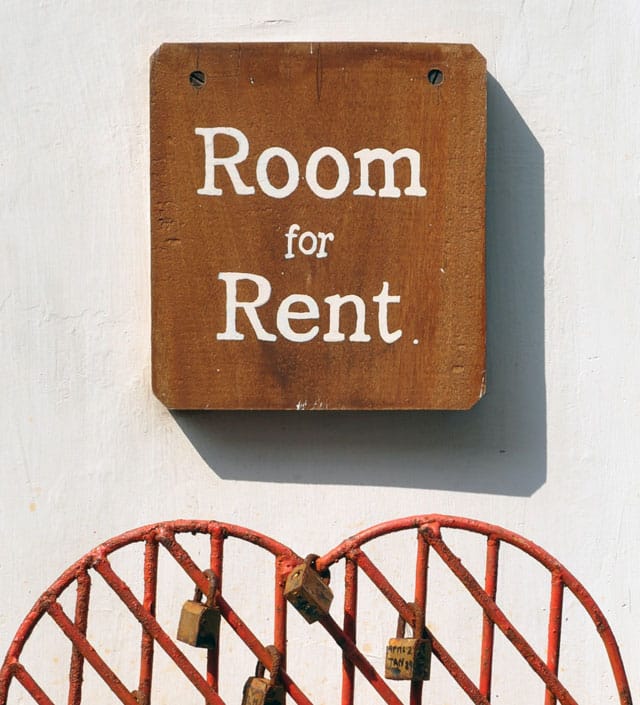Inflation, an unstable employment market and a shortage of appealing housing are bringing people together who might not otherwise have dreamed they’d share the same roof.
And technology like FaceTime is quickening the getting-to-know-you phase and easing the transition from stranger to roommate.
A number of platforms have popped up that are connecting people of different ages.
Silvernest, for example, pairs homeowners with qualified housemates, based on available space, location, compatibility and rental costs. It recently began a program A Little Help, a Denver-based nonprofit that assists older adults with everyday tasks and needs to they can continue to live in their own homes. The program enables older hosts to connect with Silvernest’s homeseekers.
An AARP survey revealed that 77% of responding older Americans wish to age in their homes.
Silvernest says the average user of its service earns $850 a month. There is no charge to post a listing. The basic free service lets users list the space; view an applicant’s suitability score; reply to messages from homeseekers and receive telephone support. For $24.95 monthly, listers are provided with background checks and a rental agreement. A background check otherwise is $29.99.
The home-sharing movement is hardly new: in 1980, Maggie Kuhn, founder of the Gray Panthers and an advocate for older adults, founded the non-profit National Shared Housing Resource Center (NSHRC), a nationwide network of independent non-profit home-sharing programs. Its website lists organizations in 17 states and an international program, too. Its focus, rather than on web-based, online matching portals, is on person-centered programs.
And then there’s the old-fashioned but still viable approach: word-of-mouth and recommendations from friends and family.
Wealth management clients share roofs, too.
Susan, a 71-year-old retired speech language pathologist who worked with children 2 to 18 and also worked in the “Mad Men’’ world of advertising in Manhattan, had discussed with her financial advisor her concerns about the safety of growing older alone in New York City, and her fairly steep monthly rental of $2,400.
Susan is a client of financial planner Sara Stanich, founder and president of fee-only Cultivating Wealth. She was based in New York for many years but now lives in Montauk on Long Island and runs a 100% virtual practice.
Stanich says she recommends clients think creatively when trying to supplement income. “So when she [Susan] said she could get a roommate, I said, ‘More power to her!’’’
Stretching savings
Susan’s expenses are a little bit high, says Stanich, and having some extra income from renting a room in her two-bedroom, two-bath apartment makes it easier for her to delay withdrawing money from her savings.
“It was a win-win situation for both: a good deal for a furnished apartment, a short-term lease and an end-date for my client,’’ says Stanich. Susan’s latest roommate is a 20-something student who landed a summer internship in NYC and needed a home for a few months.
Susan was able to cut her rent by more than 40% by welcoming her new roommate. She charged the student $1,000 monthly for a bedroom, shared bath “and not much shelf space in the refrigerator.’’
A trusted recommendation
This is the second time Susan has rented out a room in her apartment. The first time was to a friend of her adult daughter. That first roommate then connected Susan with the student, whom she had mentored for months after being referred by friends and professors at her alma mater.
“I was contemplating how I could continue to live in my home for as long as possible, both for financial reasons and safety as I age,” and that’s “how the idea [of renting out a room again] emerged,” says Susan.
She and the student agreed to meet on FaceTime and after talking, “we seemed to be very comfortable with one another and the commitment evolved from there. I agreed to this, in part, because it had a finite time limit and the young woman had employment, in addition to the solid referral,’’ she says.
Susan has lived in New York for more than 40 years and is an active volunteer in her church as well as with various organizations that focus on climate change and gun control, and with city-park and public-school programs.
Because she and her tenant were on different time schedules, they interacted sporadically, but they did arrange described their conversations as “easy and comfortable, for the most part.”
“I like being around younger people. I like to know what they think and what their lives are like and I like to expose them to being around older people so they realize our points of view are just as valuable as theirs. Having conversations and an exchange of ideas and opinions with others whose lives are so different from mine keeps my brain working and keeps me engaged in the world;’’ Susan said.
Finding a balance
Susan, who enjoys mothering her adult daughter, also found herself falling into that role on a limited basis with her 20-something roommate.
“There are times that they appreciate a little bit of mothering with the clear understanding that I am not trying to take on that role,’’ she said.
Not surprisingly, Susan found that her young tenant hadn’t quite developed housekeeping skills on a par with her own.
“She was terrible about caring for her room,” she says, “but it was her space,” so it became a matter of “finding the balance of how much control I have over this and how much to let go … If she was living with me longer, I’d have set some more specific parameters.”
Additional Reading: ‘House Hacking’ Can Improve Retirement Success
She’d play landlord again
Having a short-term roommate enabled Susan to relax about the arrangement, and appreciate the extra money. She’d rent again “if the circumstances were right,” she says. “At this time, I’m not looking for a long-term commitment. I do appreciate it when there’s an end in sight, but this could change as I get older. It seems like personal referrals are ideal, but I haven’t really considered what or how this process would work.’’
She had these thoughts on the virtues of having a roommate.
“Having someone present in your home has positives and negatives. Figuring out what you need and don’t need from them and what compromises you’re willing to make when you’ve been living alone has a learning curve.
“As with anything, sometimes it’s just good fortune that the match is right. This has been the case for me both times I’ve had someone stay for an extended period of time,’’ Susan said.
Nurses make good tenants
A bit more than 1,500 miles southwest of Susan’s apartment in New York, the mother and client of financial advisor Melissa Cox, CFP, has been renting rooms in her four-bedroom home in Dallas for 10 years.
A retired nurse, Cox’s mother, Marie, rents multiple rooms in her house to traveling nurses. She worked at Parkland Memorial Hospital, where President Kennedy was treated for gunshot wounds and died about 30 minutes later.
“It’s been a huge relief financially for her, and a mental and physical relief to both the client and her daughter (me)!’’ says Cox, an independent financial advisor who is associated with Fetterman Investments (www.fettermaninvestments.com).
It’s a tightly-knit group of tenants: Most are nurses who work at the same hospital as Cox’s mother’s former hospital.
“It all started with a friend that just needed a place to crash once a week because he was too tired to drive two hours back home after a shift,’’ says Marie, who asked that her last name be withheld.
“It keeps me young, and allows me to keep up with the hospital and friends,’’ she said. “We have a great time, sharing work stories, and it reminds me of my nursing days.’’
A housekeeper helps with cleaning and Cox herself helps out around the home.
Help with the ‘honey-do’ list
“My daughter takes care of the handyman duties, but sometimes I get them (the tenants) to help with small “honey-dos” like bringing in groceries, or changing an air filter. I offer to help with laundry and errands, because I know how busy they are,’’ Marie says.
Cox says her mother has a passion for helping others while she is healthy.
“It’s her way of allowing others to try to get ahead in their lives, because her mom did the same for her and others. And she does the same for people she cares about,’’ Cox said.
Her mother does not cook but keeps prepared frozen meals from a big box store ready in the freezer for needy tenants. The kitchen is well-stocked and most of the renters do their own cooking and buy their own food, but nurses working double shifts sometimes give money to Marie to shop for them.
“Most of the people that rent from me are younger. (They are) either beginning their career and new to Dallas, or they have had a change in their lives and need a reset. I also have a few that are nearing retirement and only work a few days a week here in Dallas,’’ she says. [Travel nurses — RNs who move around the country to take high-paying short-term nursing contracts at hospitals in high-demand areas — are another group continuously in need of flexible housing arrangements.]
Better than a hotel
Cox says there are ripple-effect benefits from having a mother who rents rooms to nurses.
“They are great. It was handy for me to have them there when Mom and my stepfather were going through his cancer journey. Having an extra set of trained eyes was comforting.
“It was also handy when Mom got COVID. One of the nurses at that time was in the COVID ward, and helped monitor Mom’s condition at home so I didn’t expose my two young daughters. Having nurses live with Mom helps to reduce my stress about Mom being there alone and something happening to her,’’ Cox says.
An obvious benefit for renters is saving money by renting a room rather than paying for a hotel or motel. “The people renting from her like to stay at her house versus a hotel” for other reasons too, says Cox. “Having your own bed, and a place to put your stuff is nice. It’s the comforts of home in a safe neighborhood, close to work, without the cost of a house or apartment’’
One nurse going through a difficult divorce stayed for several months. Regulars who work only a few days a week in Dallas nevertheless have a room that is “locked in,’’ says Cox.
Extra spending money
An obvious benefit to Marie is having a daughter who is a financial advisor who can help her navigate the role of landlady.
“She was actually having a friend live with her even before she retired. A lot of nurses she worked with would drive in from East and West Texas, which is more than a two-hour dive, and she would let a few of them crash on her couch,’’ says Cox.
“Being an empathetic nurse that she is, she was giving everything to everybody, out of the kindness of her heart; she’d let them come in and stay and they would give her a little bit of money,’’ Cox says.
“Now, she’s charging, but she hasn’t always been the strongest with her finances. I stepped in and started helping her take care of her finances, and with that plan, she is able to meet all of her monthly expenses.
More than money
“She does have Social Security and pensions and all of that, so it was not a real financial need decision but it’s nice for her to have the extra spending money. She does it more for the companionship,’’ says Cox, who visits her mother weekly.
“All of this is between caring for her grandkids; she takes them to school,’’ she says. Cox’s oldest daughter spends Friday nights with her grandmother.
The age span of tenants includes a nurse who is nearing retirement, and a nurse and police officer couple in their late 30s to early 40s.
“It’s great, everyone is interesting,” says Cox. I’ve got cameras all over the outside of the house and it’s funny to watch them gather on the back porch, smoking cigarettes and playing card games and all of them just laughing, really laughing and having a good time and relieving the stress.’’
In a four-decade career in journalism, Eleanor O’Sullivan has reviewed many books on best practices for financial advisors, has written for Financial Advisor and the USA Today network, and was movie critic for the Asbury Park Press.







